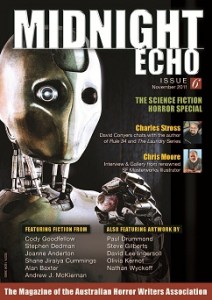Some grim news came out today regarding Notions Unlimited Bookshop, one of Australia’s favourite bookstores. Owner-operator, all round good guy, and king of all that’s spec-fic, Chuck McKenzie, announced that the bookshop is in very real danger of closing by Christmas or soon after, due to the ever rising costs of running a business.
The following is taken directly from the Notions Unlimited Bookshop‘s website:
Since the day we opened our doors, just 20 months ago, the staff and management of Notions Unlimited Bookshop have worked hard to create something more than just a specialist bookstore, and we feel genuinely proud of much that we’ve achieved during that time, such as:
# Continuing to offer a great range of publications, including the best of Australian small-press, rare and hard-to-get titles, genre classics, and latest new releases.
# Building and maintaining a reputation for friendly and knowledgeable service.
# Keeping our prices reasonable – no mean task in these days of Internet shopping and global economic downturn.
# Becoming accepted as part of the local community, plus creating an ever-growing community of our own, bringing together fans of SF, fantasy, horror, graphic novels, gaming, manga, esoteric interests and more – something we’re especially proud of, and that we hope to continue doing for a long time to come.
In order for us to reach that last goal, however, we really do need the assistance of our customers, general supporters, and Facebook subscribers at this time.
Currently, Notions Unlimited Bookshop is looking at the very real possibility of closure – if not by Christmas, then perhaps just afterwards – with the chief cause being the ever-rising cost of running the business. It’s not definite at this point, but the writing is on the wall, and this appeal is an attempt to reverse matters before it’s too late.
Our aim, therefore, is not just to increase our daily sales, but to substantially increase the number of potential customers. Previously, we have tried to boost customer numbers through signage, social media and print advertising – yet almost 80% of our customers tell us they discovered us through referral from friends, family or colleagues.
So this is exactly what we’re asking our friends and customers to do for us now – refer us!
In a nutshell, while we’d love you to pop into our shop over the next few weeks and purchase a book (or two) to help keep us afloat, what we really want you to do is tell other people about us. Jump on Twitter and Facebook, tell your friends, family, workmates, and anybody else you know who loves SF, fantasy, horror, graphic novels, manga, media tie-ins, gaming, esoteric subjects, and other such related genres, to come and check us out in person (and then tell all of their peeps!). We’re not looking for handouts – just introductions to potential customers who may help to keep us in business. And do be sure to mention to everyone you refer us to that this is all in aid of keeping Notions Unlimited Bookshop operating.
Finally, I just want to make it absolutely clear that this is a genuine appeal, not some fake ‘going out of business’ sale or marketing trick. If things don’t improve markedly for us over the next month, we will almost certainly be forced to close our doors forever. No business owner ever wants to admit that a business is failing, but there comes a time when that owner has to either quietly slide towards the inevitable, or step into the spotlight and ask for assistance. So, if you feel you can assist, and will do so, you will have the absolute gratitude of myself and my staff – as well as, hopefully, a future in which we may continue to provide you with the range, service and community you deserve.
In the meantime, a massive and heartfelt ‘thank-you’ to all of our customers, regular and casual, who have supported us already since we opened. We couldn’t have survived thus far without you.
With Thanks,
Chuck McKenzie (Chief Zombologist)
Notions Unlimited Bookshop
facebook.com/pages/Notions-Unlimited-Bookshop/
@notionsun
info@notionsunlimitedbookshop.com
Bookshops are an endangered entity in this day and age, and whenever one closes its doors for good, we are all a little poorer for it. Don’t let this happen to Notions Unlimited Bookshop. Please help in any way you can.
 Terra Magazine, Issue #1
Terra Magazine, Issue #1